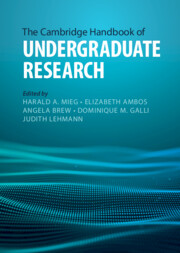Book contents
- The Cambridge Handbook of Undergraduate Research
- The Cambridge Handbook of Undergraduate Research
- Copyright page
- Contents
- Figures
- Tables
- Contributors
- Foreword
- Foreword
- 1 Introduction
- Part I Theory and Research on Undergraduate Research
- Part II Implementation, Approaches, Methods
- Part III Disciplines
- Part IV International Perspective
- 47 Introduction
- Part IV.1 Americas
- 48 Undergraduate Research in the USA
- 49 Undergraduate Research in Canada
- 50 Undergraduate Research in Argentina
- 51 Undergraduate Research in Brazil
- 52 Undergraduate Research in Colombia
- 53 Undergraduate Research in Mexico
- Part IV.2 Africa & Middle East
- Part IV.3 Asia & Oceania
- Part IV.4 Europe
- Part V Avenues for Developing Undergraduate Research
- Index
- References
49 - Undergraduate Research in Canada
Growing a Culture of Research for Undergraduate Education
from Part IV.1 - Americas
Published online by Cambridge University Press: 11 August 2022
- The Cambridge Handbook of Undergraduate Research
- The Cambridge Handbook of Undergraduate Research
- Copyright page
- Contents
- Figures
- Tables
- Contributors
- Foreword
- Foreword
- 1 Introduction
- Part I Theory and Research on Undergraduate Research
- Part II Implementation, Approaches, Methods
- Part III Disciplines
- Part IV International Perspective
- 47 Introduction
- Part IV.1 Americas
- 48 Undergraduate Research in the USA
- 49 Undergraduate Research in Canada
- 50 Undergraduate Research in Argentina
- 51 Undergraduate Research in Brazil
- 52 Undergraduate Research in Colombia
- 53 Undergraduate Research in Mexico
- Part IV.2 Africa & Middle East
- Part IV.3 Asia & Oceania
- Part IV.4 Europe
- Part V Avenues for Developing Undergraduate Research
- Index
- References
Summary
Higher education in Canada seeks to provide opportunities for students to succeed by advancing scholarly, technical, and practical (employability) skills. Some institutions, especially research-oriented degree-granting universities, engage students with research in order to advance such skills. Increasingly, undergraduate research opportunities align with preparing students for further studies or the workforce through projects that connect with community and industry. Faculty, staff, and administrators provide undergraduate research through curricular and co-curricular initiatives as a proven way to enhance and amplify the student experience while driving research outputs and campus partnerships. Current trends mean an intensification of challenges to sustain funding for the traditional faculty-mentored student project. As a result, diversification of undergraduate research is occurring. While benefits for students are still generated in terms of skill development and career clarification, Canadian campuses are investing in more innovative opportunities.
- Type
- Chapter
- Information
- The Cambridge Handbook of Undergraduate Research , pp. 456 - 463Publisher: Cambridge University PressPrint publication year: 2022
References
- 1
- Cited by

